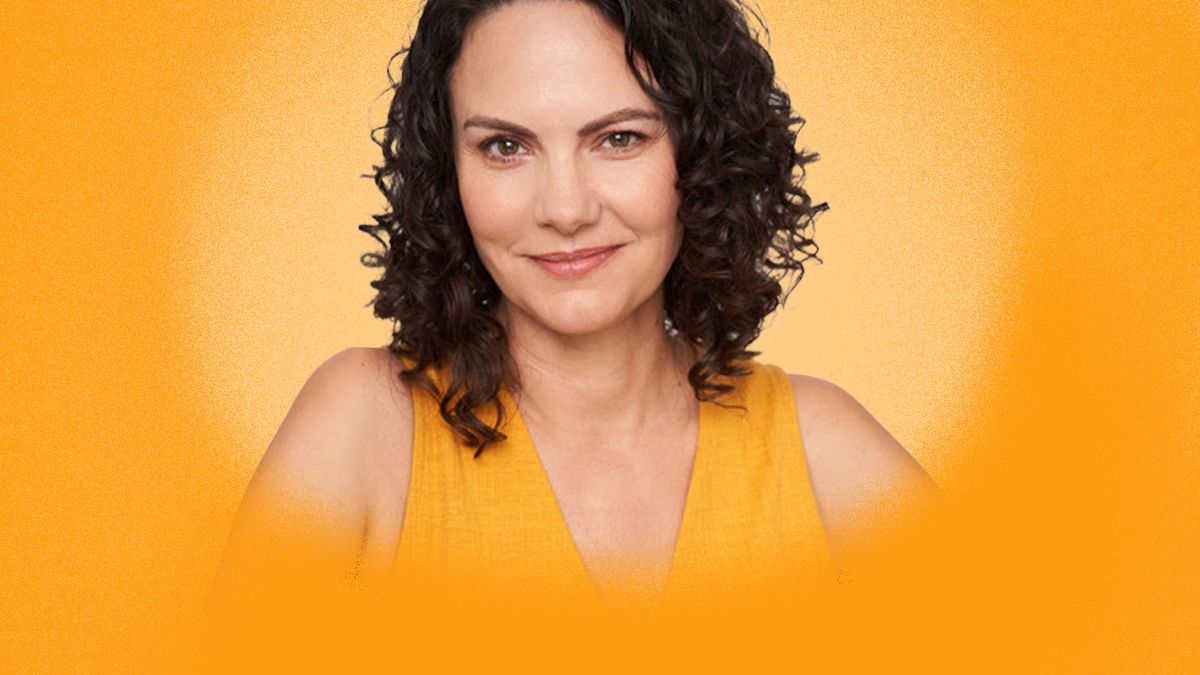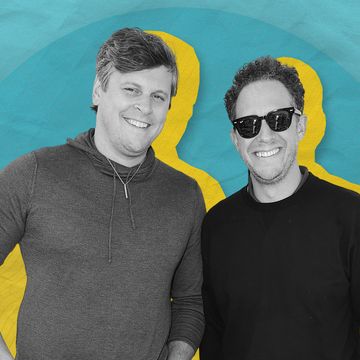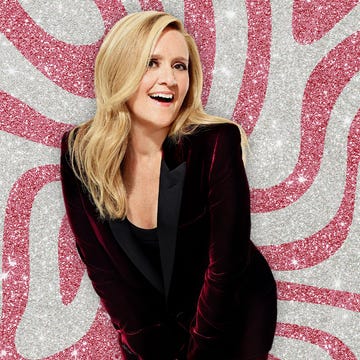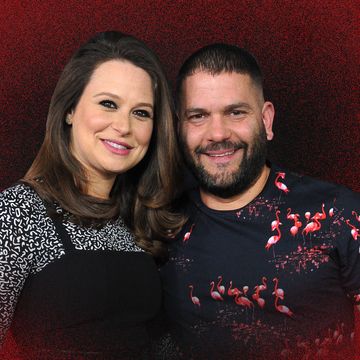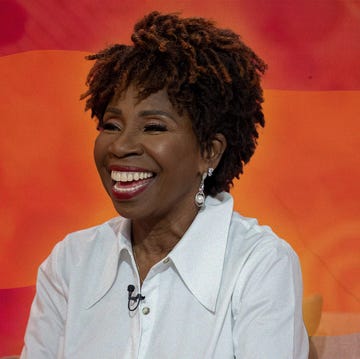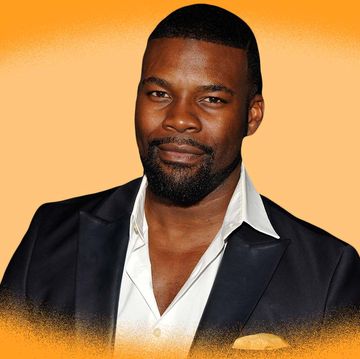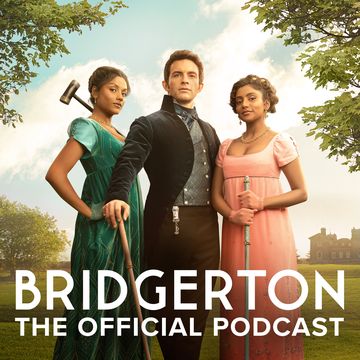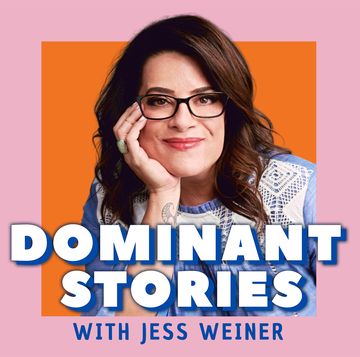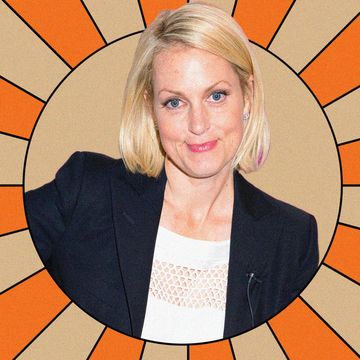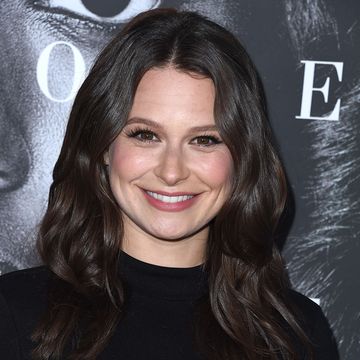Jennifer Christopher has been acting for about 25 years. She has five dozen credits to her name, mostly in TV shows like CBS’ Criminal Minds, Netflix’s The OA, and ABC’s How to Get Away With Murder. But Christopher — who had a unique upbringing on the road with her parents, who worked for U-Haul — sometimes feels like the grind of it all can become too much.
“People see all your credits, and they say you’ve done a lot,” Christopher tells Shondaland. “But as an actor, sometimes you feel like you haven’t done anything. I’m never working as much as I want to work. Are there other projects and bigger roles I’d like to do? Absolutely. But I’ve always done [this] because I love it. It’s never been a fame thing for me. It’s never, ever been about that.”
It’s that desire to simply do good work that’s now brought Christopher to #Matter, Shondaland Audio’s first scripted podcast, from writer-director Dylan Brown. Christopher plays Kate Bell, a white journalist who digs into a year-old story, hoping to unearth some deeper cultural truths about a fateful event where, after a young Black man, Niles, is killed at the hands of white police officers, Niles’ father finds himself further involved in unexpected ways. In one episode, Bell acknowledges that she might be a “journalistic Karen” but that if she gets canceled in the process of trying to bring truth to a tragic event that changed some people’s lives forever, “then so be it.” The result is a narrative podcast with a fascinating look at race relations and power dynamics that raises meaningful questions about whose story gets to be told and by whom.
While podcast acting is new for Christopher, she fell into acting in the first place with a production of Fame in junior high. A few classes at community college is where she realized she’d never do anything else. That feeling is where Christopher always tries to bring herself back to — that place where she feels the importance of the craft. Because being in Hollywood is not the same as being an actor.
“Being an actor is in your spirit and in your heart,” she says. “And that’s what’s nice about a podcast. I can go back to being an actor without having to look a certain way or without having to present myself a certain way. I can just focus on the work, and all the other stuff is gone.”
As the sixth episode of #Matter airs, Shondaland sits down with Christopher to talk about playing Bell, the importance of the subject matter, and what it’s like acting in a sound booth.
And if you’ve missed any episode of #Matter, remember to subscribe at iHeart, Apple, or wherever you get your favorite podcasts.
VALENTINA VALENTINI: How did you get involved in this project?
JENNIFER CHRISTOPHER: [Producer] Toby Lawless had cast me in a couple other podcasts, and he cast me in this too. I would not have known about this project if he didn’t think of me for it. He called and told me that he thought I’d be perfect for this. And as soon as I read it, I knew that I wanted it. It felt like it was my role. But as you know, in this business, it doesn’t always pan out that way. So, I put myself on tape for the audition, and I was proud of it. I sent it in, and fairly soon after, they gave me dates to hold for a possible booking. I was thrilled! But that kept getting extended; the dates for recording kept getting pushed back for various scheduling reasons. And in that process, I knew that they were probably going to audition a lot of women for this role. So, I was on my hands and knees doing a lot of praying because I really wanted this job. There are a lot of auditions that you get, and there’s not a complete connection to it, but Kate Bell was just living inside of me. And I thought, if this turns out my way, it’s going to be such a gift.
VV: Why did you feel such a connection to Kate?
JC: We both share a strong sense of justice — what’s right and wrong and what circumstances lead people to the choices they ultimately make. I felt very connected to Kate in this way from the start. Understanding what makes people tick has always fascinated me, which is probably one of the main reasons I love being an actor. The deep-down “Why?” I’m fascinated with how a different environment, or maybe a role model in one’s life, can set your path in a different direction. But justice for Niles was always at the forefront. Because Niles is in so many of the stories we already know. He represents all the Black men and boys losing their lives in heinous ways. It was important for me to bring curiosity into the world of Kate Bell. To really try and understand all points of view. And because Dylan wrote such a phenomenal script, it made it easy to just step into the world. Dylan allowed me — Kate — to ask questions of the key players but also of myself.
I also think Kate fluctuates between the evidence provided and her gut. Which is something I tend to do as well. Trusting it gets easier as I get older, but sometimes I look back and think, “Yeah, I didn’t trust that so much.” I feel like she is learning how to do that more. I think this is a turning point for her, and this investigation will forever change how she investigates and sees the world.
VV: Dylan said that he fell in love with your voice and the cadence and empathy that you bring to the piece.
JC: Being an actor, you have to step into an empathetic position. You have to try to understand what the character is going through, but there’s a lot that Kate doesn’t understand. And there’s a lot that Jennifer doesn’t understand too. I say it in the first episode, “I’m a 40-year-old white woman using her voice to get the story out.” That’s intriguing to her and to me, trying to figure out how the characters, Kate included, in this story feel. But Dylan wrote this so well that there was just something about his words that resonated with my heart.
VV: Even though this is a fictional story, it’s dealing with an incident that easily could have happened yesterday or could happen tomorrow. What is your take on being part of a narrative story that’s so close to reality?
JC: Exactly. It could be on the news later today. And that was something that I carried every session I walked into. This is not just a project to be excited about, but it has an importance in this world. [Pauses.] I’m sorry; I might cry. [Pauses.] There’s something that’s really powerful about what Dylan is presenting, because it is so relative to our lives right now with so many communities being affected by this. It was extremely important for me to bring what I’m feeling right now into the project. It’s hard, because it is fiction, but it’s not fiction. Even promoting it sometimes feels strange to me as an actor. You do a project, and you’re so excited, and you want people to know about it, but where’s the line there? This show is so much greater than just a job as an actor.
VV: Dylan has said that as much as he wants to shed light on the issues, he also wants #Matter to be an entertaining experience for listeners. What were your conversations like with him about bringing Kate and this story to life?
JC: Yeah, there is a fine line between art and real life. The weave of it all can be messy and beautiful at the same time. I felt that immediately with #Matter. As an actor, for me at least, storytelling is the drug. Finding the truth and ultimately the voice in the storytelling. And that’s important for Dylan as well. When you have a story with so much real life around it, real life that everyone is a part of because we’ve experienced it together in different ways, of course, it can be tricky. Putting a lens up to all of it is hard — the pain, the struggle, the confusion, the heartbreak. You just have to do it because it fulfills you, and I know that Dylan put his heart into this story and took a look at more points of view than many are willing to look at. We talked about how he went back and forth in the details of this story and whether it should be told by a white woman or a Black woman. He came to the conclusion that Kate being white was a way to step back and look at it from the outside. And I felt that. I feel that. So many Black families and communities know what these tragedies feel like, and Kate doesn’t. Jen doesn’t either. I have questions, and I want to truly try to understand. And I want questions asked of me by others and to be okay with not having all the answers but maybe just listening. For this story, Dylan gave Kate — gave me — a lot of questions. Kate questions everything, every step of the way. She seems to come to a conclusion, and then that gets turned around, and then maybe turned around again. She’s a journalist, but she’s human first, and it was so easy to dive in because there was so much on the page to start with.
VV: Give us an idea of what it’s like to perform a podcast. What’s it like making this audio-only story?
JC: It’s really comforting to do a podcast and to be in a booth. It’s like you’re in a womb, and you have fuzzy slippers on, and you have a warm tea at arm’s length at all times. You get to utilize everything that you have as an actor, but there’s just this comfort and ease in being in that little room alone. And it was so amazing to work with Dylan and the sound director, Alexander Kemp. The three of us were like a hive mind and would bounce things off of each other; there was a lot of play. It was really collaborative.
When I did all my narrator stuff, that was just me in a booth, and Dylan and Alex were in another booth, and there was an iPad, which we would communicate through. I couldn’t even really see them. But when I had scenes with other characters, we, the actors, would be across from each other, or if it was a phone call, they’d put us in separate booths so that they could create the sound design around that. But if it was just two characters in a room talking, we were right there together, recording across from one another.
VV: When did you get into voice acting?
JC: I haven’t done much — a few projects, and they’ve all been with [production company] Wolf at the Door and Toby Lawless casting them. So, I’m very new to it. I do like it. And like I said before, I love that you can bring everything that you’ve learned as an actor to the table in a voice-over, but you don’t have to get dressed up. Like I can bring the same intentions about how I feel about different characters within the story as well, how it can change me — all of that is there without having a camera in front of your face. It’s still communication, which is what screen acting is all about.
I just have to give a shout-out to Dylan and thank him. And to Toby. It’s been such a pleasure to work with them, and it’s been one of those projects that will live with me forever. I’ll be eternally grateful for it and for [Dylan] writing it, for telling the story, and for involving me in it.
VV: With your background in theater, I wonder, are podcasts similar to that environment in a way?
JC: There’s a creation during a rehearsal process for theater where nothing’s there. There is no set; there are no props. You start in a black box with blocks as pieces of furniture. So, there’s a level of imagination that has to happen. Whereas in TV and film, you walk on to the set, and it’s all there. You want a glass of water; they hand you a glass of water. You have everything. With the podcasts, you’re the one getting to paint that picture. You’re there to tell the story. And Dylan has very thoughtful and thorough imagery within his storytelling, so it makes it a breeze to do.
This interview has been edited and condensed for clarity.
Valentina Valentini is a London-based entertainment, travel, and food writer and also a Senior Contributor for Shondaland. Elsewhere she has written for Vanity Fair, Vulture, Variety, Thrillist, Heated, and The Washington Post. Her personal essays can be read in the Los Angeles Times, Longreads, and her tangents and general complaints can be seen on Twitter at @ByValentinaV.
Get Shondaland directly in your inbox: SUBSCRIBE TODAY
